中国外交政策翻译
- 格式:doc
- 大小:48.00 KB
- 文档页数:8
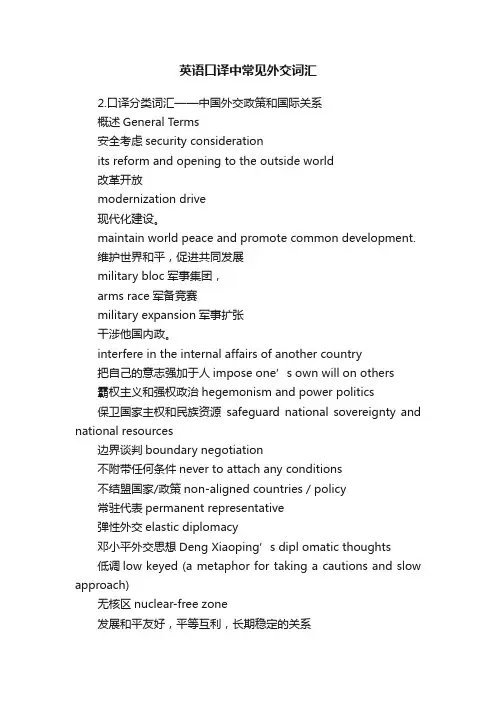
英语口译中常见外交词汇2.口译分类词汇——中国外交政策和国际关系概述General Terms安全考虑security considerationits reform and opening to the outside world改革开放modernization drive现代化建设。
maintain world peace and promote common development.维护世界和平,促进共同发展military bloc军事集团,arms race军备竞赛military expansion军事扩张干涉他国内政。
interfere in the internal affairs of another country把自己的意志强加于人impose one’s own will on others霸权主义和强权政治hegemonism and power politics保卫国家主权和民族资源safeguard national sovereignty and national resources边界谈判boundary negotiation不附带任何条件never to attach any conditions不结盟国家/政策non-aligned countries / policy常驻代表permanent representative弹性外交elastic diplomacy邓小平外交思想Deng Xiaoping’s dipl omatic thoughts低调low keyed (a metaphor for taking a cautions and slow approach)无核区nuclear-free zone发展和平友好,平等互利,长期稳定的关系develop relations of peace and friendship , equality and mutual benefit , and prolonged stability附庸国dependency高层次,全方位的对话high-level and all-directional dialogue 公认的国际关系原则generally-accepted principles of international relations公正合理的国际政治经济新秩序a fair and rational new international political and economic order搞政治游戏Play political games国际惯例internationa l common practice行使否决权to exercise the power of veto over国际货币基金会International Monetary Fund (IMF)国际金融组织International Finance Corporation (IFC)国际聚焦international spotlight国家不分大小,应该一律平等All countries , big or small , should be equal捍卫国家主权,领土完整和民族尊严safeguard national sovereignty , territorial integrity , and national dignity毫无根据的媒体报道groundless media reports和平共处五项原则the Five Principles of Peaceful Coexistence 互谅互让mutual understanding and mutual accommodation 互通有无exchange of needed goods环太平洋地区Pacific Rim礼宾司Protocol Department立即作出响应make an immediate response流血冲突bloody conflict民间外交people-to-people diplomacy民意调查研究者public opinion research fellow南北对话South-North dialogue南南合作South-South cooperation全方位外交multi-dimensional diplomacy伸张正义,主持公道adhere to principles and uphold justice 神圣不可侵犯sacred and inviolable审视度势size up the situation诉诸武力或以武力相威胁resort to the use force or the threat of force外交纷争diplomatic dispute外交使团diplomatic mission外交政策的基石cornerstone of a country’s foreign policy维持外交关系maintain diplomatic relations维护人权和不断改善人权状况safeguard human rights and steadily improve the human rights situation维护世界和平safeguard world peace无中生有make/create something out of nothing武装冲突armed conflict西方国家利益Western interests用和平手段解决争端settle disputes by peaceful means正式照会formal note政府声明government statement中立国neutral state总领事馆consulate general互相尊重,求同存异adhere to the principle of mutual respect and seek common ground while shelving differences本着求同存异的精神In the spirit of seek common ground while shelving differences 世界多元化Muilt-polarization of the world经济全球化Economic globalization建立/中断/断绝外交关系Establish/suspend/sever diplomatic relations促进共同发展promote common development借口pretext强加impose国际政治经济新秩序New international political and economic order state visit 国事访问Sino-US relations 中美关系bilateral tie 双边关系bilateral cooperation 双边合作joint statement 联合声明in the spirit of the joint statement 本着联合声明的精神China-US joint communique 中美联合公报top leaders 最高领导人national interests 国家利益common interests of the two countries 两国共同利益frequent meetings 频繁会晤start a new era in US-China relations 开创中美关系的新时代the normalization of US-China relations 中美关系正常化overall strategic partnership 全面战略伙伴关系rapprochement 恢复邦交Ping Pong diplomacy 乒乓外交high-level cooperation 高层协作establish diplomatic ties 建立邦交mutual trust 相互信任common prosperity 共同繁荣peaceful coexistence 和平共处the situation on the Korean Peninsula 朝鲜半岛局势resumption of Six-Party Talks 重启六方会谈high-level visit 高层访问maintain a low profile 保持低姿态China will never seek hegemony. 中国永远不会称霸。
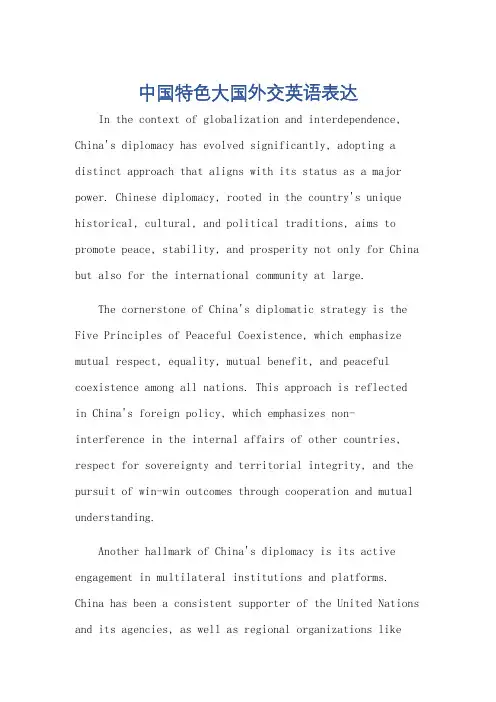
中国特色大国外交英语表达In the context of globalization and interdependence, China's diplomacy has evolved significantly, adopting a distinct approach that aligns with its status as a major power. Chinese diplomacy, rooted in the country's unique historical, cultural, and political traditions, aims to promote peace, stability, and prosperity not only for China but also for the international community at large.The cornerstone of China's diplomatic strategy is the Five Principles of Peaceful Coexistence, which emphasize mutual respect, equality, mutual benefit, and peaceful coexistence among all nations. This approach is reflectedin China's foreign policy, which emphasizes non-interference in the internal affairs of other countries, respect for sovereignty and territorial integrity, and the pursuit of win-win outcomes through cooperation and mutual understanding.Another hallmark of China's diplomacy is its active engagement in multilateral institutions and platforms. China has been a consistent supporter of the United Nations and its agencies, as well as regional organizations likethe Association of Southeast Asian Nations (ASEAN) and the Shanghai Cooperation Organization (SCO). Through these institutions, China has played a constructive role in addressing global challenges such as climate change, poverty alleviation, and international security.In recent years, China has also emphasized the concept of "a community with a shared future for mankind," which calls for greater cooperation and solidarity among all countries to address common challenges and achieve common prosperity. This vision is reflected in China's Belt and Road Initiative (BRI), a massive infrastructure development program that aims to connect Asia, Europe, and Africa through trade and infrastructure projects, promoting economic integration and mutual benefit.The language of Chinese diplomacy is also distinctive, often employing phrases like "win-win cooperation" and "mutual respect" to communicate its commitment to harmonious international relations. This language reflects China's belief that diplomacy should be conducted with wisdom and restraint, avoiding confrontation and seeking common ground whenever possible.In sum, Chinese diplomacy represents a unique blend of tradition and modernity, rooted in the country's deep cultural heritage while also adapting to the changing global landscape. It is a外交政策 that strives to promote peace, stability, and prosperity both domestically and internationally, and is expressed through a diplomatic language that emphasizes mutual respect, equality, and cooperation. As China continues to play an increasingly important role in global affairs, its distinctive diplomatic approach and language will remain a key component of its engagement with the world.**中国特色大国外交的英语表达与实践**在全球化和相互依存的大背景下,中国的外交政策发生了显著变化,采取了一种与其大国地位相符的独特方法。

1. Diplomacy 外交2. Ambassador 大使3. Consulate 领事馆4. Embassy 大使馆5. Diplomat 外交官6. Negotiation 谈判7. Summit 峰会8. Treaty 条约9. Protocol 外交礼节10. Alliance 联盟11. Delegation 代表团12. Diplomatic immunity 外交豁免权13. Bilateral 双边的14. Multilateral 多边的15. International 国际的16. Mediation 调解17. Conflict 冲突18. Crisis 危机19. Summit meeting 峰会20. Peace 和平21. War 战争22. Neutrality 中立23. Security 安全24. Sovereignty 主权25. Sanction 制裁26. Embargo 禁运27. Human rights 人权28. Refugee 难民29. Terrorism 恐怖主义30. Nonproliferation 非扩散31. Aid 援助32. Development 发展33. Globalization 全球化34. Economic cooperation 经济合作35. Foreign policy 外交政策36. International relations 国际关系37. Summit conference 峰会38. Diplomatic corps 外交团39. Diplomatic mission 外交使团40. Peacekeeping 维和41. Disarmament 裁军42. Negotiator 谈判代表43. Host country 接待国44. Official visit 正式访问45. Bilateral talks 双边会谈46. Multilateral talks 多边会谈47. Foreign aid 外援48. Peace treaty 和平条约49. Economic sanctions 经济制裁50. Ceasefire 停火51. Diplomatic relations 外交关系52. Foreign minister 外交部长53. Diplomatic pouch 外交邮袋54. National interest 国家利益55. International law 国际法56. Diplomatic mission 外交任务57. Diplomatic corps 外交团体58. Diplomatic protocol 外交礼仪59. Diplomatic bag 外交邮袋60. Diplomatic service 外交事务61. Diplomatic immunity 外交豁免权62. Diplomatic channels 外交渠道63. Diplomatic reception 外交接待64. Diplomatic incident 外交事件65. Diplomatic relations 外交关系66. Diplomatic negotiations 外交谈判67. Diplomatic passport 外交护照68. Diplomatic recognition 外交承认69. Diplomatic status 外交地位70. Diplomatic mission 外交任务71. Diplomatic note 外交函件72. Diplomatic protest 外交抗议73. Diplomatic quarter 外交区74. Diplomatic representative 外交代表75. Diplomatic service 外交事务76. Diplomatic staff 外交人员77. Diplomatic corps 外交团体78. Diplomatic immunity 外交豁免权79. Diplomatic pouch 外交邮袋80. Diplomatic protocol 外交礼仪81. Diplomatic bag 外交邮袋82. Diplomatic service 外交事务83. Diplomatic immunity 外交豁免权84. Diplomatic channels 外交渠道85. Diplomatic reception 外交接待86. Diplomatic incident 外交事件87. Diplomatic relations 外交关系88. Diplomatic negotiations 外交谈判89. Diplomatic passport 外交护照90. Diplomatic recognition 外交承认91. Diplomatic status 外交地位92. Diplomatic mission 外交任务93. Diplomatic note 外交函件94. Diplomatic protest 外交抗议95. Diplomatic quarter 外交区96. Diplomatic representative 外交代表97. Diplomatic service 外交事务98. Diplomatic101. Diplomatic corps 外交团体102. Diplomatic immunity 外交豁免权103. Diplomatic pouch 外交邮袋104. Diplomatic protocol 外交礼仪105. Diplomatic bag 外交邮袋106. Diplomatic service 外交事务107. Diplomatic immunity 外交豁免权108. Diplomatic channels 外交渠道109. Diplomatic reception 外交接待110. Diplomatic incident 外交事件111. Diplomatic relations 外交关系113. Diplomatic passport 外交护照114. Diplomatic recognition 外交承认115. Diplomatic status 外交地位116. Diplomatic mission 外交任务117. Diplomatic note 外交函件118. Diplomatic protest 外交抗议119. Diplomatic quarter 外交区120. Diplomatic representative 外交代表121. Diplomatic service 外交事务122. Diplomatic staff 外交人员123. Diplomatic corps 外交团体124. Diplomatic immunity 外交豁免权125. Diplomatic pouch 外交邮袋126. Diplomatic protocol 外交礼仪127. Diplomatic bag 外交邮袋128. Diplomatic service 外交事务129. Diplomatic immunity 外交豁免权130. Diplomatic channels 外交渠道131. Diplomatic reception 外交接待132. Diplomatic incident 外交事件133. Diplomatic relations 外交关系135. Diplomatic passport 外交护照136. Diplomatic recognition 外交承认137. Diplomatic status 外交地位138. Diplomatic mission 外交任务139. Diplomatic note 外交函件140. Diplomatic protest 外交抗议。
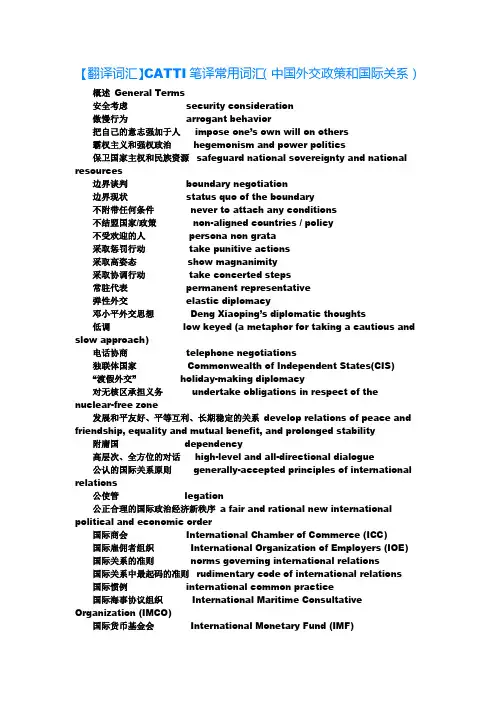
【翻译词汇】CATTI笔译常用词汇(中国外交政策和国际关系)概述General Terms安全考虑 security consideration傲慢行为 arrogant behavior把自己的意志强加于人impose one’s own will on others霸权主义和强权政治 hegemonism and power politics保卫国家主权和民族资源 safeguard national sovereignty and national resources边界谈判 boundary negotiation边界现状 status quo of the boundary不附带任何条件 never to attach any conditions不结盟国家/政策 non-aligned countries / policy不受欢迎的人 persona non grata采取惩罚行动 take punitive actions采取高姿态 show magnanimity采取协调行动 take concerted steps常驻代表 permanent representative弹性外交 elastic diplomacy邓小平外交思想Deng Xiaoping’s diplomatic thoughts低调 low keyed (a metaphor for taking a cautious and slow approach)电话协商 telephone negotiations独联体国家 Commonwealth of Independent States(CIS)“渡假外交” holiday-making diplomacy对无核区承担义务 undertake obligations in respect of thenuclear-free zone发展和平友好、平等互利、长期稳定的关系develop relations of peace and friendship, equality and mutual benefit, and prolonged stability 附庸国 dependency高层次、全方位的对话 high-level and all-directional dialogue公认的国际关系原则 generally-accepted principles of international relations公使管 legation公正合理的国际政治经济新秩序 a fair and rational new international political and economic order国际商会 International Chamber of Commerce (ICC)国际雇佣者组织 International Organization of Employers (IOE) 国际关系的准则 norms governing international relations国际关系中最起码的准则 rudimentary code of international relations 国际惯例 international common practice国际海事协议组织 International Maritime Consultative Organization (IMCO)国际货币基金会 International Monetary Fund (IMF)国际金融组织 International Finance Corporation (IFC)国际聚焦 international spotlight国际日期变更线 International Date Line (IDL)国家不分大小,应该一律平等。
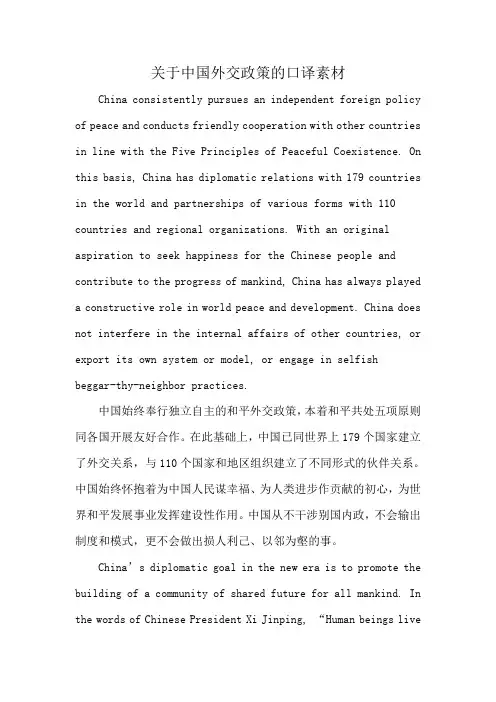
关于中国外交政策的口译素材China consistently pursues an independent foreign policy of peace and conducts friendly cooperation with other countries in line with the Five Principles of Peaceful Coexistence. On this basis, China has diplomatic relations with 179 countries in the world and partnerships of various forms with 110 countries and regional organizations. With an original aspiration to seek happiness for the Chinese people and contribute to the progress of mankind, China has always played a constructive role in world peace and development. China does not interfere in the internal affairs of other countries, or export its own system or model, or engage in selfishbeggar-thy-neighbor practices.中国始终奉行独立自主的和平外交政策,本着和平共处五项原则同各国开展友好合作。
在此基础上,中国已同世界上179个国家建立了外交关系,与110个国家和地区组织建立了不同形式的伙伴关系。
中国始终怀抱着为中国人民谋幸福、为人类进步作贡献的初心,为世界和平发展事业发挥建设性作用。
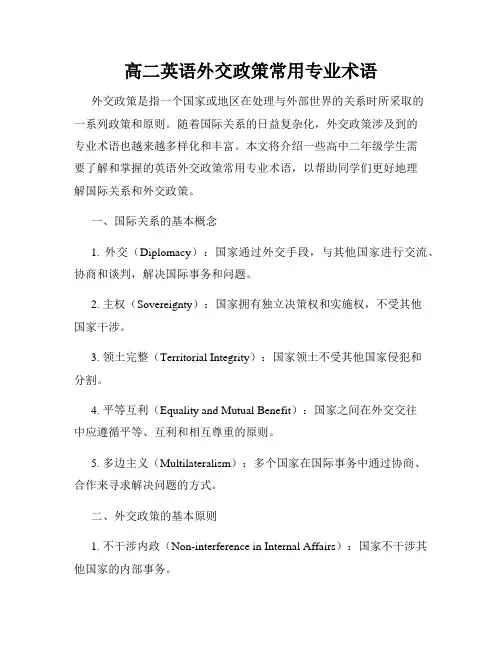
高二英语外交政策常用专业术语外交政策是指一个国家或地区在处理与外部世界的关系时所采取的一系列政策和原则。
随着国际关系的日益复杂化,外交政策涉及到的专业术语也越来越多样化和丰富。
本文将介绍一些高中二年级学生需要了解和掌握的英语外交政策常用专业术语,以帮助同学们更好地理解国际关系和外交政策。
一、国际关系的基本概念1. 外交(Diplomacy):国家通过外交手段,与其他国家进行交流、协商和谈判,解决国际事务和问题。
2. 主权(Sovereignty):国家拥有独立决策权和实施权,不受其他国家干涉。
3. 领土完整(Territorial Integrity):国家领土不受其他国家侵犯和分割。
4. 平等互利(Equality and Mutual Benefit):国家之间在外交交往中应遵循平等、互利和相互尊重的原则。
5. 多边主义(Multilateralism):多个国家在国际事务中通过协商、合作来寻求解决问题的方式。
二、外交政策的基本原则1. 不干涉内政(Non-interference in Internal Affairs):国家不干涉其他国家的内部事务。
2. 和平共处(Peaceful Coexistence):国家应通过和平手段解决争端,维护和平与和谐的国际关系。
3. 预防战争(Prevention of War):国家应预防战争的发生,并通过不同的方式来避免战争。
4. 和解与调停(Reconciliation and Mediation):国家应积极调停争端,促进各方和解。
5. 外交豁免(Diplomatic Immunity):外交人员在特定情况下可以享受到免于执法追究的特权。
三、外交政策的主要工具和行动1. 外交官(Diplomat):代表国家与其他国家进行外交活动的专业人士。
2. 外交使团(Diplomatic Mission):国家派往外国的代表团,包括大使馆、使领馆等。
3. 外交谈判(Diplomatic Negotiation):国家之间通过谈判来解决争端和达成协议。
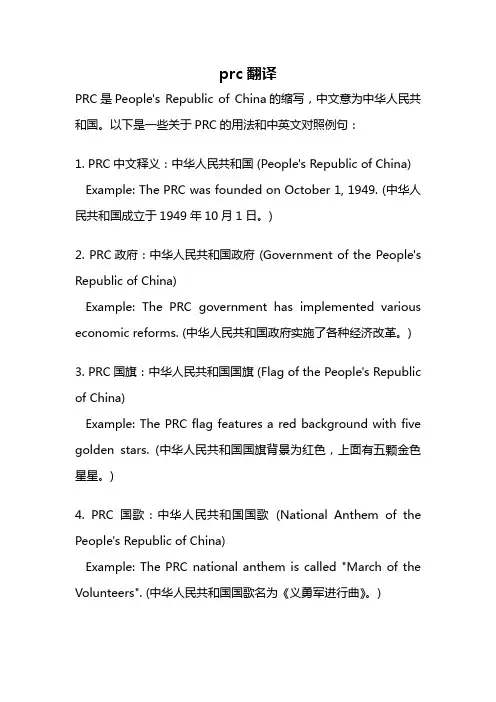
prc翻译PRC是People's Republic of China的缩写,中文意为中华人民共和国。
以下是一些关于PRC的用法和中英文对照例句:1. PRC中文释义:中华人民共和国 (People's Republic of China) Example: The PRC was founded on October 1, 1949. (中华人民共和国成立于1949年10月1日。
)2. PRC政府:中华人民共和国政府 (Government of the People's Republic of China)Example: The PRC government has implemented various economic reforms. (中华人民共和国政府实施了各种经济改革。
)3. PRC国旗:中华人民共和国国旗 (Flag of the People's Republic of China)Example: The PRC flag features a red background with five golden stars. (中华人民共和国国旗背景为红色,上面有五颗金色星星。
)4. PRC国歌:中华人民共和国国歌(National Anthem of the People's Republic of China)Example: The PRC national anthem is called "March of the Volunteers". (中华人民共和国国歌名为《义勇军进行曲》。
)5. PRC领土:中华人民共和国领土(Territory of the People's Republic of China)Example: The PRC claims sovereignty over Taiwan and the South China Sea islands. (中华人民共和国声称对台湾和南海诸岛拥有主权。

外交词汇解读大全一、基本外交词汇1. 建交(set up diplomatic relations):指两个国家正式建立外交关系。
2. 断交(break off diplomatic relations):指两个国家中断外交关系。
3. 复交(resume diplomatic relations):指两个国家重新建立外交关系。
4. 派往国(host country):指接待他国家的外交代表的国家。
5. 驻在国(country of residence):指外国外交代表驻留的国家。
6. 外交代表(diplomatic representative):指被派遣或接受国派遣到另一国从事外交活动的人员。
7. 等级对等原则(principle of reciprocity):指在国际外交事务中,各国给予对方的外交待遇不应低于己方给予己方的外交待遇。
8. 尊重主权和平等互利原则(principle of respect for sovereignty and equality in international relations):指在国际外交事务中,各国应相互尊重主权,平等相待,不干涉内政,通过和平方式解决国际争端。
二、国际组织相关词汇9. 联合国(United Nations,简称UN):全球性的国际组织,旨在维护国际和平与安全,促进各国之间的经济、社会和文化进步。
10. 世界贸易组织(World Trade Organization,简称WTO):全球性的经济贸易组织,负责制定国际贸易规则和进行贸易谈判。
11. 国际货币基金组织(International Monetary Fund,简称IMF):国际金融组织,负责监督会员国的汇率稳定和国际储备的平衡。
12. 世界银行(World Bank):国际金融组织,旨在通过向发展中国家提供贷款和技术援助,帮助其经济发展和减少贫困。
三、国际关系相关词汇13. 外交政策(foreign policy):国家为实现其对外目标而制定的总体战略和政策。
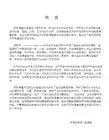
外交学名词解释1、对外政策分析二战后,在美国等国家,出现了对对外政策的研究,主要研究某个对外政策是如何制定的,被称作对外政策分析(foreign policy analysis)。
2、外交VS外交政策外交政策是foreign policy 的翻译。
严格地讲应为“对外政策”。
这一词语主要在于区别政府所做的面向国内民众的政策,即国内政策,主要指一国所做出旨在影响另一国,或数国的政策决定。
这些政策决定有些是公开的,有些是秘密的。
一般包括政治(军事)和经济,文化等方面。
外交指由外交行为者(国家元首,政府首脑,外交部长,相关的部长,国内有关政府部门,驻外外交人员)为执行该政策决定所从事的诸活动。
3、代表即在驻在国,其他国家,国际组织(区域性和全球性),以及国际会议上代表本国政府或者国际组织处理有关外交问题。
通常我们说的代表团或者特使其作用之一就是代表本国政府或者国际组织。
代表的含义指“在场”和“接近的管道”。
在场就是出现,出席,或存在于某个外交活动的场所。
接近的管道指与驻在国或者国际组织通过在场保持接触。
代表不限于主权国家,二战以后一些国际组织也开始向其他国家或者国际组织派驻代表机构。
如欧盟驻中国代表团。
4、常设代表指一国所派出的常驻另一个国家的大使,总领事,领事(菲律宾驻厦门领事);以及一国所派出的常驻国际组织的代表,如中国常驻联合国代表机构。
5、临时代表指试图处理,或解决某一具体外交事务所派出的外交代表。
如伊拉克入侵科威特以后钱其琛作为中国特使出使中东。
印度尼西亚商业代表团访问韩国商洽有关军备贸易的问题。
临时代表可以是国家派出的,也可以是国际组织派出的。
临时代表的工作主要是解决一些迫切需要解决的问题,如上述钱其琛的中东之行。
此外也从事着一些礼仪性的工作,如通常所说的吊唁外交。
6、交往指各种类型外交行为体间的往来。
交往的含义指外交行为体间的意思疏通。
即各行为体向其政策对象行为体传达其政策主张,立场或者看法,并接受对方的有关主张,立场或者看法。
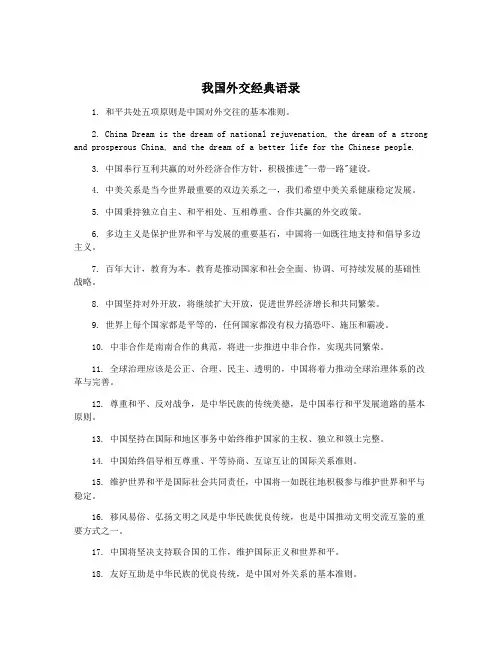
我国外交经典语录1. 和平共处五项原则是中国对外交往的基本准则。
2. China Dream is the dream of national rejuvenation, the dream of a strong and prosperous China, and the dream of a better life for the Chinese people.3. 中国奉行互利共赢的对外经济合作方针,积极推进"一带一路"建设。
4. 中美关系是当今世界最重要的双边关系之一,我们希望中美关系健康稳定发展。
5. 中国秉持独立自主、和平相处、互相尊重、合作共赢的外交政策。
6. 多边主义是保护世界和平与发展的重要基石,中国将一如既往地支持和倡导多边主义。
7. 百年大计,教育为本。
教育是推动国家和社会全面、协调、可持续发展的基础性战略。
8. 中国坚持对外开放,将继续扩大开放,促进世界经济增长和共同繁荣。
9. 世界上每个国家都是平等的,任何国家都没有权力搞恐吓、施压和霸凌。
10. 中非合作是南南合作的典范,将进一步推进中非合作,实现共同繁荣。
11. 全球治理应该是公正、合理、民主、透明的,中国将着力推动全球治理体系的改革与完善。
12. 尊重和平、反对战争,是中华民族的传统美德,是中国奉行和平发展道路的基本原则。
13. 中国坚持在国际和地区事务中始终维护国家的主权、独立和领土完整。
14. 中国始终倡导相互尊重、平等协商、互谅互让的国际关系准则。
15. 维护世界和平是国际社会共同责任,中国将一如既往地积极参与维护世界和平与稳定。
16. 移风易俗、弘扬文明之风是中华民族优良传统,也是中国推动文明交流互鉴的重要方式之一。
17. 中国将坚决支持联合国的工作,维护国际正义和世界和平。
18. 友好互助是中华民族的优良传统,是中国对外关系的基本准则。
19. 中国坚持睦邻互信、敦睦睦邻、共同发展的周边外交方针。
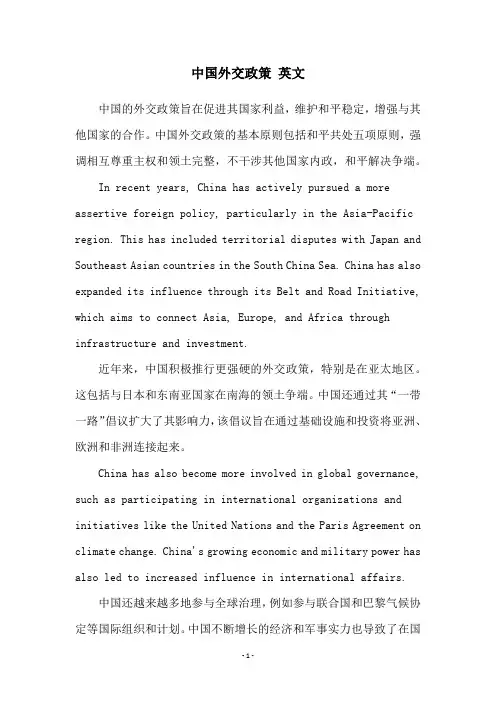
中国外交政策英文中国的外交政策旨在促进其国家利益,维护和平稳定,增强与其他国家的合作。
中国外交政策的基本原则包括和平共处五项原则,强调相互尊重主权和领土完整,不干涉其他国家内政,和平解决争端。
In recent years, China has actively pursued a more assertive foreign policy, particularly in the Asia-Pacific region. This has included territorial disputes with Japan and Southeast Asian countries in the South China Sea. China has also expanded its influence through its Belt and Road Initiative, which aims to connect Asia, Europe, and Africa through infrastructure and investment.近年来,中国积极推行更强硬的外交政策,特别是在亚太地区。
这包括与日本和东南亚国家在南海的领土争端。
中国还通过其“一带一路”倡议扩大了其影响力,该倡议旨在通过基础设施和投资将亚洲、欧洲和非洲连接起来。
China has also become more involved in global governance, such as participating in international organizations and initiatives like the United Nations and the Paris Agreement on climate change. China's growing economic and military power has also led to increased influence in international affairs.中国还越来越多地参与全球治理,例如参与联合国和巴黎气候协定等国际组织和计划。
中高级口译词汇-外交和军事篇中国外交1. “走出去”(战略)going global2. 安全security, safety3. 霸权hegemony4. 闭关锁国的过去closed-door past5. 闭关政策closed-door policy6. 标准criteria7. 博大深远extensive and profound8. 不对抗non-confrontatio9. 不合理irrationality10. 不结盟non-alignment11. 不可克服的困难insurmountable difficulty12. 不平等inequality13. 不懈的努力 unremitting efforts14. 采取具体步骤 undertake concrete ste p15. 差距gap16. 尝试attempt17. 充满活力dynamism18. 崇高的事业lofty cause19. 崇高理想grand ideal20. 处理分歧address differences21. 穿梭外交shuttle diplomacy22. 打破障碍beak down barriers23. 单边的 unilateral24. 单边主义 unilateralism25. 邓小平外交思想Deng Xiaoping’s dipl omatic thoughts26. 低估 underestimate / undere stimation27. 地方矛盾regional conflicts28. 地球村global village29. 地区差异 regional disparity30. 地区动乱(冲突)regional turmoil (conflicts)31. 独立自主的和平外交政策independent foreign policy of peace32. 独立自主原则principles of independence33. 度假外交holiday-making diplomacy 34. 对手opponent ; rival35. 对外工作external work36. 多边外交multilateral diplomatic act ivities37. 多边政策multilateralism38. 多极化multi-polarization39. 多极时代multipolar times40. 多极世界 multipolar world41. 多极性multi-polarity42. 繁荣prosperity43. 繁荣昌盛flourish44. 仿效imitation45. 分工division of responsibilitie s 46. 分裂活动splittist activities47. 分歧 issues of difference 48. 否决权veto right49. 复杂多变的国际形势a complex and volatile inte rnational situation50. 复杂化complication51. 复杂性complexity52. 改善,改进ameliorate53. 高层次、全方位的对话high-level and all-directio nal dialogue54. 高峰论坛summit (forum)55. 高级官员senior officials56. 隔阂estrangement57. 各国人民的福祉well-being of all nations58. 公告proclamation59. 公平fairness60. 公正,正义justice61. 共识 consensus62. 共赢all-win63. 国家元首head of state国际外交1. 国与国state-to-state2. 过渡期the transitional period3. 过分go overboard4. 合法权益the legitimate rights and i nterests5. 合作关系cooperative relationship 6. 和睦关系harmonious relationship7. 和平peace8. 和平方式peaceful means9. 和平共处peaceful coexistence10. 和平外交 peace diplomacy11. 后果;结果 consequence12. 互不干涉内部事务noninterference in each oth er’s internal affairs13. 互不往来non-communication14. 互惠合同reciprocal contract15. 互利合作的伙伴partners of mutual benefit and cooperation16. 怀疑suspicion17. 环太平洋国家Pacific rim countries18. 缓解(冲突) buffer (conflicts)19. 恢复行使主权 resume the exercise of s overeignty (over…)20. 回顾过去 in retrospect21. 机制mechanism22. 积极防御active defense23. 积极影响positive impact24. 基石cornerstone25. 极大的希望great expectation26. 集合;凝聚aggregation27. 肩负shoulder28. 艰巨任务arduous task29. 建设性的战略伙伴关系a constructive strategic pa rtnership30. 交换意见exchange notes31. 交流观点exchange views32. 结交新友establish new contacts33. 竭力仿效emulate34. 解决分歧resolve differences35. 进步 progress; advancement36. 举世闻名word-renowned37. 军事机密 military intelligence (secrets)38. 考验 test39. 肯定传统affirm old tradition40. 框架framework41. 扩大共识expand the common ground 42. 来之不易hard-won43. 乐观精神optimism44. 礼尚往来reciprocity in courtesy; re ciprocal (mutual) courtesy 45. 礼仪;行为准则 decencies46. 良好诚意good faith47. 良好周边环境a favorable climate in areas around china48. 良知 conscience49. 两岸关系cross-strait relations50. 领土完整territorial integrity51. 领土争端border or territorial dispu tes52. 履行国际义务fulfill international oblig ations53. 盟国ally; allies54. 民间外交people-to-people diplomacy55. 模式mode56. 摩擦friction57. 睦邻友好good-neighborliness58. 睦邻友好关系good-neighbor relationship 59. 排除干扰与障碍remove interferences and ob stacles60. 排他性集团exclusive group61. 排外主义 exclusivism62. 批准ratify63. 平等互利equality and mutual benefit 64. 平等互利原则principle of equality and m utual benefit65. 平等伙伴关系equal partnership66. 平等协商equal consultation67. 齐心协力concerted effort68. 歧视discrimination69. 起积极作用make positive contribution to70. 千年millennium71. 前景prospect; future72. 谴责 condemn73. 强权外交 power diplomacy74. 强权政策 power politics75. 强制执行enforcement76. 侵犯violate; encroach on; an en croachment on77. 求同存异seek common ground while reserving/shelving/putting aside differences78. 曲折twists and turns79. 屈服 yield to80. 趋势 trend81. 全方位合作all-round cooperation82. 全面的;全方位的all-round; all-around83. 全面接触comprehensive engagement 84. 全面提高all-round improvement 85. 全球化globalization86. 全世界 the world at large; the world over87. 权利和义务rights and interests88. 让步(make ) concessions 89. 人道主义者humanitarian90. 融合fusion91. 三边的 trilateral92. 深切哀悼 convey profound condol ences to93. 审时度势 size up the situation94. 使命mission95. 事业 undertaking, cause96. 势头momentum97. 树立共有的乐观精神 build shared optimism 98. 双边的bilateral99. 双边关系bilateral relations100. 双边合作bilateral cooperation101. 双边渠道bilateral channels102. 双边外交bilateral diplomatic activities103. 双赢局面win-win situation104. 顺利平稳过渡smooth transition of power105. 坦诚深入的candid and in-depth106. 条约 treaty107. 停滞不前 halt108. 同等尊严equal dignity109. 突破break-through110. 团结 unity111. 外部封锁external blockade112. 外交diplomacy113. 外交惯例diplomatic practice 114. 外交豁免权diplomatic immunity 115. 外交晴雨表diplomatic barometer 116. 外交使节diplomatic envoy 117. 外交休兵diplomatic truce118. 完全不信任downright distrust119. 完全平等complete equality120. 顽疾stubborn ills121. 为大众谋利seek a common good122. 维护香港的繁荣与稳定 maintain the prosperity and stability of Hong Kong 123. 维护正义的 justice-upholding124. 文化交流cultural exchange125. 文化使节cultural ambassador126. 文化摇篮cradle of civilization127. 无情的事实inexorable facts128. 无秩序状态disorder129. 现状current state130. 详细谈论elaborate on131. 协调harmonize132. 协定agreement133. 结盟alliance134. 协议protocol135. 协作coordination136. 携手 join (our) hands ; han d-in-hand137. 新的世界形态a new world pattern 138. 新殖民主义neo-colonialism139. 宣称;维护assert140. 宣告,声明 declaration141. 亚太地区the Asia-Pacific region 142. 严峻的考验 severe test143. 唁电message of condolences 144. 一贯的政策 consistent policy145. 以史为鉴,面向未来 take history as guidance and look into the future 146. 意识形态ideology147. 永不屈服never yielding148. 增进increase, strengthen, promo te, expand, boost149. 增进了解enhance mutual understanding150. 战略关系strategic relationship151. 战略协作伙伴关系strategic partnership of coordination152. 正常化normalization153. 正确的对外方针correct foreign policy154. 正式访问an official visit155. 政权交接 transfer of government156. 政权交接the transfer of government157. 政治对话political dialogs158. 政治和道义上的支持political and moral support159. 中长期的合作 medium and long term coo peration160. 中日和平友好条约the Sino-Japanese Treaty fo r Peace and Friendship 161. 种族隔离apartheid; racial segregati on162. 种族矛盾racial tensions163. 种族歧视racial discrimination164. 着手处理approach (a problem)165. 重新评估reuation166. 主权国家sovereign states167. 驻军 garrison168. 自决自主 self-determination169. 自我封闭 self-reclusive170. 最不发达国家Least-developed countries (LDCs)171. 和平共处五项基本原则the Five Principles of Peac eful Coexistence· -- 平等互利Equality and mutual benefit· -- 互相尊重和主权领土完整mutual respect for sovereig nty, territorial integrity· -- 互不侵犯Non-aggression· -- 互不干涉内政Non-interference in the int ernal affairs of other coun tries · -- 和平共处Peaceful coexistence。
中国外交政策英文IntroductionChina’s foreign policy plays a crucial role in shaping itsinternational relations and safeguarding its national interests. This article aims to provide a comprehensive and in-depth analysis ofChina’s foreign policy, exploring its objectives, approaches, and major initiatives on the global stage.Objectives of China’s Foreign PolicyChina’s foreign policy is guided by several core objectives:1.Safeguarding National Sovereignty: China aims to protect itsterritorial integrity and national sovereignty, actively opposing any form of foreign interference in its internal affairs.2.Promoting National Development: China seeks a peaceful and stableinternational environment to facilitate its economic developmentand improve the living standards of its people.3.Upholding Global Governance: China advocates for a fair and justinternational order, promoting multilateralism, and opposing theimposition of unilateralism by any individual country.4.Strengthening Diplomatic Relations: China strives to enhance itsbilateral and multilateral diplomatic relations, cultivatingfriendships and partnerships with other countries based on mutual respect and cooperation.Approaches of China’s Foreign PolicyChina adopts several key approaches in pursuing its foreign policy objectives:1. Peaceful DevelopmentChina follows a path of peaceful development, emphasizing non-interference in the internal affairs of other countries and advocating for resolving disputes through peaceful negotiations and dialogue.2. Win-win CooperationChina promotes win-win cooperation by actively engaging with other countries on issues of common interest, such as trade, investment, and development projects. This approach aims to foster mutual benefits and shared prosperity.3. Soft Power DiplomacyChina utilizes soft power diplomacy to enhance its global influence. Through cultural exchanges, educational programs, and media cooperation, China aims to shape a positive international image and improve its appeal to other nations.4. Strategic PartnershipsChina seeks to establish strategic partnerships with countries that share common interests and goals. These partnerships involve close political, economic, and security cooperation, which contribute to regional stability and global multipolarity.Major Initiatives i n China’s Foreign PolicyChina has undertaken several major initiatives to strengthen its global presence and promote its foreign policy objectives:1. Belt and Road Initiative (BRI)The Belt and Road Initiative is China’s flagship foreign policy initiative. It aims to enhance connectivity and promote economic cooperation across the Eurasian continent through infrastructure development and trade facilitation.2. South China Sea DisputeChina’s stance on the South China Sea dispute is a significant aspect of its foreign policy. China asserts its territorial claims in the region, advocating for peaceful resolution through negotiations and dialogue with the involved parties.3. Regional and Global CooperationChina actively participates in regional and global cooperation platforms, such as the Shanghai Cooperation Organization (SCO), the BRICS forum,and the United Nations. These engagements enable China to contribute to global governance and address common challenges.4. Public DiplomacyChina prioritizes public diplomacy to enhance its soft power and promote cultural exchanges with other countries. Initiatives like the Confucius Institutes, Chinese language programs, and cultural festivals facilitate cross-cultural understanding and foster people-to-people exchanges.ConclusionChina’s foreign policy is driven by its core objectives of safeguarding national sovereignty, promoting national development, upholding global governance, and strengthening diplomatic relations. Through its peaceful development approach, win-win cooperation, soft power diplomacy, and strategic partnerships, China strives to assert itself on the global stage while maintaining regional stability and promoting multilateralism. Major initiatives like the Belt and Road Initiative, efforts inresolving the South China Sea dispute, active participation in regional and global cooperation, and emphasis on public diplomacy contribute to China’s foreign policy objectives and its evolving role ininternational affairs.。
中高级口译考试词汇必备一、政治类。
1. diplomacy [dɪˈpləʊməsi] n. 外交;外交手腕;交际手段。
- 例句:China pursues an independent foreign policy of peace in its diplomacy.(中国在外交中奉行独立自主的和平外交政策。
)2. negotiation [nɪˌɡəʊʃiˈeɪʃn] n. 谈判;协商;转让。
- 例句:The negotiation between the two countries lasted for several months.(两国之间的谈判持续了几个月。
)3. treaty [ˈtriːti] n. 条约;协议;谈判。
- 例句:The two sides signed a treaty of friendship and cooperation.(双方签署了友好合作条约。
)二、经济类。
1. economy [ɪˈkɒnəmi] n. 经济;节约;理财。
- 例句:The global economy is facing many challenges.(全球经济正面临许多挑战。
)2. inflation [ɪnˈfleɪʃn] n. 膨胀;通货膨胀;夸张。
- 例句:High inflation can have a negative impact on people's living standards.(高通货膨胀会对人们的生活水平产生负面影响。
)3. revenue [ˈrevənjuː] n. 税收收入;财政收入;收益。
- 例句:The government's revenue mainly comes from taxes.(政府的收入主要来自税收。
)三、文化类。
1. heritage [ˈherɪtɪdʒ] n. 遗产;传统;继承物;继承权。
- 例句:This ancient building is part of our national heritage.(这座古老的建筑是我们国家遗产的一部分。
关于中国特色大国外交论述英语On the discussion of major-country diplomacy with Chinese characteristics, it can be said that China has always adhered to an independent foreign policy of peace, emphasizing mutual respect, equality, and mutually beneficial cooperation. This 外交政策reflects China's pursuit of peaceful development, international cooperation, and contribution to global governance.China insists on peaceful coexistence and puts the settlement of disputes through dialogue and consultation first. It advocates building a community with a shared future for mankind, emphasizing cooperation among countries regardless of their size, strength, or social system. China actively participates in global governance and contributes Chinese wisdom and solutions to address global challenges such as climate change and poverty reduction.China also emphasizes the principle of non-interference in other countries' internal affairs, respecting the right of each country to choose its own path of development. At the same time, China is committed to building mutually beneficial partnerships, strengthening cooperation with other countries in areas such as economy, trade, and cultural exchanges.In general, major-country diplomacy with Chinese characteristics aims to maintain world peace, promote common development, and build a more just and reasonable international order. Through these diplomatic concepts and practices, China demonstrates its responsibility as a major country and makes positive contributions to global stability and prosperity.。
中国对外关系法英文对照China's Foreign Relations LawChapter 1: General ProvisionsArticle 1: This law is enacted in accordance with the Constitution of the People's Republic of China to regulate China's foreign relations, safeguard national sovereignty and territorial integrity, and maintain world peace and development.Article 2: China adheres to the principles of independence, equality, mutual respect, and non-interference in the internal affairs of other countries in its diplomatic activities.Article 3: The Ministry of Foreign Affairs of the People's Republic of China is the principal organ responsible for China's foreign affairs.Chapter 2: Diplomatic RelationsArticle 4: The People's Republic of China establishes diplomatic relations with other countries on the basis of the principles of equality, mutual respect, and non-aggression.Article 5: The establishment of diplomatic relations shall be concluded through diplomatic negotiations and the signing of bilateral agreements in accordance with the principles of international law.Article 6: The People's Republic of China has the right to send and receive diplomatic envoys, consuls, and other necessary personnel to and from foreign countries.Chapter 3: Economic and Trade RelationsArticle 7: The People's Republic of China promotes mutually beneficial economic and trade relations with other countries on the basis of equality and mutual benefit.Article 8: China encourages and protects foreign investment in accordance with the law and provides a sound legal and business environment for foreign enterprises.Article 9: China carries out international economic and trade exchanges and cooperation on the principles of equality, mutual benefit, and win-win cooperation.Chapter 4: Cultural and Educational ExchangesArticle 10: The People's Republic of China actively participates in international cultural and educational exchanges to promote mutual understanding and friendship between peoples of different countries.Article 11: China protects the rights and interests of foreign cultural and educational institutions and personnel in accordance with the law.Article 12: The People's Republic of China promotes the teaching and learning of Chinese language and culture overseas.Chapter 5: Settlement of Disputes and TreatiesArticle 13: The People's Republic of China settles international disputes through peaceful means, including negotiation, mediation, and arbitration.Article 14: China promotes the conclusion of treaties and agreements with other countries and respects the obligations stipulated in such treaties and agreements.Article 15: If international treaties to which China is a party conflict with this law, the provisions of the treaties shall prevail.Chapter 6: Implementation and Supplementary ProvisionsArticle 16: This law shall come into effect on the date of its promulgation.Article 17: Any foreign relations agreements concluded by the People's Republic of China prior to the implementation of this law shall continue to be valid, unless they are incompatible with the provisions of this law.Article 18: The State Council of the People's Republic of China may formulate detailed implementation rules for this law.ConclusionChina's Foreign Relations Law plays a crucial role in regulating China's interactions with the international community. Based on principles of independence, equality, and non-interference, China seeks to build diplomatic relations, promote economic and trade cooperation, facilitate cultural and educational exchanges, and settle disputes through peaceful means. By adhering to this law, China aims to foster mutual understanding, friendship, and contribute to global peace and development.。
香港香港是中国的一部分。
自古以来,我们的祖先在这块土地上劳动、生活。
历史上从秦代到清朝,中国一直对香港实行管辖,行使主权。
19世纪中叶,英国发动两次鸦片战争,迫使腐败无能的清政府签订了不平等条约并于1898年侵占了整个香港地区。
香港于1997年7月1日回归祖国,现有人口约630万。
Hong Kong is an inalienable part of China. Since ancient times, our ancestors lived and labored on this land. Historically from the Qing Dynasty to the Qing Dynasty, China exercised jurisdiction and sovereignty over Hong Kong. In mid-19th century after launching two Opium Wars, Britain forced the corrupt and incompetent Qing government to sign the unequal treaties. In 1898, Britain occupied the entire Hong Kong region.On July 1, 1997, Hong Kong finally returned to the motherland. It has a population of 6.3 million.◆香港同胞有着光荣的爱国主义传统Hong Kong compatriots have a glorious patriotic tradition.◆一国两制、港人治港及高度自治等基本方针将不会改变The basic policies of one country, two systems, Hong Kong people administering Hong Kong and a high degree of autonomy will remain unchanged.◆香港将继续保持作为国际财经金融中心的地位Hong Kong will continue to retain its status of functioning as an international financial center◆未来的香港,人人都有平等竞争的机会In future Hong Kong, everyone will be given an equal right for competition澳门自古以来,澳门就是中国的领土。
我们的祖先很早就开始在澳门生活。
16世纪中期,葡萄牙人行贿中国朝廷官员,获准借澳门暂住。
19世纪鸦片战争前,葡萄牙人已完全控制了澳门。
1887年清政府被迫签订了不平等的《中葡条约》。
1987年,中葡签订了"中葡联合声明",宣布澳门为中国领土,中国政府将于1999年12月20日对其恢复行使主权。
澳门于1999年12月20日回归祖国;现有人口约45万。
Macao is historically Chinese territory and the ancestors of the Chinese people started to live in Macao as early as the New Stone Age. During the mid-16th century, the Portuguese bribed Chinese officials and obtained permission to live on the Macao Peninsula temporarily. In the 19th century, the Portuguese took full control over Macao in the wake of the Opium War. In 1887, the Qing government was forced to signan unequal treaty and Portuguese stayed in Macao permanently.In 1987, China and Portugal signed the Sino=Portuguese Joint Declaration which declared Macao is Chinese territory and that the Chinese Government would resume the exercise of sovereignty over it from December20, 1999. It now has a population of about 450,000.◆澳门的回归将从此借宿外国在中国土地上统治耻辱的年代Macao's return will end years of humiliating foreign rule over Chinese land. ◆澳门社会市中西文化融合,同时也是连结海峡两岸的桥梁Macao society is a blend of Chinese and Western cultures and acts as a bridge linking the two sides of the Taiwan Straits.台湾◆台湾市中国领土不可分割的一部分。
1895年,日本通过侵华战争强迫清gov签订不平等的《马关条约》,霸占了台湾。
1945年,中国gov新恢复对台湾行使主权。
台湾现有人口约2094万。
Taiwan is an inalienable part of China. In 1895, through a war of aggression against China, Japan forced the Qing Government to sign the unequal Treaty of Shimonoseki, and forcibly occupied Taiwan. In 1945, the Chinese Government recovered Taiwan, resuming the exercise of sovereignty over Taiwan.Taiwan has a population of about 20.94 million.◆一个中国原则是实现和平统一的基础和前提The one-China principle is the basis and prerequisite for achieving peaceful reunification◆在一个中国原则下,什么问题都可以谈Any question can be discussed under one-China principle.◆不能允许台湾问题的解决再无限期地拖下去了The people of the whole of China cannot allow the resolution of the Taiwan issue to be dragged on indefinitely◆台湾新领导人的选举,并不能改变台湾是中国领土的一部分的事实The election of a new leader in Taiwan cannot change the fact that Taiwan is part of Chinese territory◆我们解决台湾问题的原则是"和平统一祖国和一国两制"Our guideline for solving the Taiwan question is "peaceful reunification and the one country, two systems"◆台湾当局必须抛弃"两国"论The Taiwanese authorities must abandon "two states" statement方针(Major Policies)一个国家,两种制度One country, two systems.◆港人治港Hong Kong people administer Hong Kong◆澳人治澳Macao people administer Macao◆一个中国的原则One-China principle◆和平统一祖国Peaceful reunification of the motherland◆高度自治a high degree of autonomy改革开放基本观点(Basic Viewpoints)◆发展是硬道理Development is the main principle◆深化改革,加强和改善宏观调控Deepen reform and strengthen and improve macro-control◆在我国现代化过程中,我们必须始终坚持一手抓物质文明,一手抓精神文明。
In the process of China's modernization, we must always work for material progress and at the same time for cultural and ethical progress◆深化改革为国民经济和社会发展注入了新的活力。
The deepened reform has injected a flow of fresh vitality into our national economic and social development.◆市场也有盲目性和局限性。
The market is unplanned and has its limitations.◆国有企业改革是当前经济体制改革的重点。
The reform of state-owned enterprises is the principal task of the on-going economic restructuring◆我们要继续扩大对外开放,并形成全方位、多层次、宽领域的开放格局。
We must continue an omni-directional, multilevel and wide-range opening to the outside world.◆国民经济市场化、社会的程度得到明显提高。